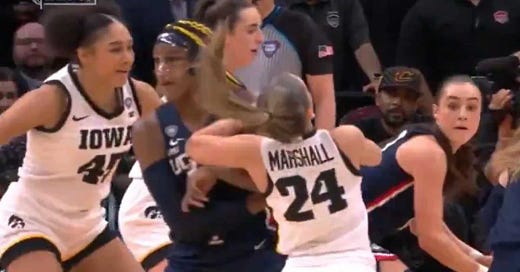Andraya Carter, ESPN analyst and former University of Tennessee star, commented, ‘I don’t even know if I can say this on TV, but that call sucked.’ This was Carter’s response and a large contingent of people on social media, including high profile names, protesting the call on an illegal screen towards the end of a hard fought Final Four contest between powerhouses UCONN and Iowa. Legendary UCONN coach, Geno Auriemma, chimed in on the commentary in his post-game interview after the loss to Iowa. While the coverage and popularity are amazing and debates are entertaining, many question arise with the reaction and what’s we witness in society.
There's probably an illegal screen call that you could make on every single possession. I just know that there were three or four of them called on us and I don't think there were any called on them.
~Geno Auriemma
You can attend a sporting contest at any age and any level and see how’s people’s attitudes and reactions mirror society. Aside from the support and cheering, there will be the inevitable chorus of complaints. These are usually levied at referees, officials, coaches, other players, and fans to fans. There is no shortage of footage of parents fans attacking referees at youth contests. Indeed, even at the highest levels legends, like Bobby Knight infamous chair throwing incident, demonstratively express their displeasure at calls not going their way.
However, in the course of game, there are many factors that can decide a game. For instance, UCONN had 71 possessions in a four quarter 40-minute game to overcome a few bad calls. They missed 34 shots and turned the ball over 14 times. They even held a 12 point lead in the 2nd quarter and led for 25 minutes of the game. Even on the last few possessions, they chose to take a timeout (allowing Iowas to strategize and set their defense) rather than push in transition and take advantage of the defense not being aligned. Despite the questionable illegal screen call, Iowa adjusted on defense and ball-side of the floor lacked spacing. It would have taken a miraculous play to change the outcome. Perhaps a fair criticism on this game is that the officials robbed UCONN and fans a potential miracle finish (however unlikely that could have been).
The broader question is whether this is where we have come to in society where every miscall is an injustice. If you follow social media post-game Iowa v. UCONN, you would get that feeling. If you attend a youth soccer match and listen to the parents, you would believe that. If you attend AAU tournaments this spring and summer, you will get plenty of examples.
‘Crazy’ folks used to be the ones to overreact and protest the unfairness. Now it’s a common occurrence echoed by the most accomplished in the sport (even though they themselves were the beneficiaries of favorable treatment…in some cases for decades). There has always been an inherent bias and favoritism that occurs in sports. Kobe and Lebron shot over 10,000 free throws in their careers. Diana Taurasi (UCONN alum) has attempted over 3,000 free throws in her WNBA career, including playoffs, and 387 at UCONN. Athletes like Tom Brady and Patrick Mahomes have certainly enjoyed many calls and advantages that elevated their success and careers prompting the ‘GOAT’ debates.
Adversity is part of life. There are many moments that you one gets knocked down and faces unfair calls or circumstances. It is well understood that some of those calls have a big impact and may even influence the end result. But the reality is that there may have been 71 other chances to change the outcome. It will be interesting to see how the continuous objections and scrutiny to unfair calls in sports will influence society. In the meantime, we’re going to sit back and be entertained by the 2024 Women’s and Men’s Final Four Championships.




